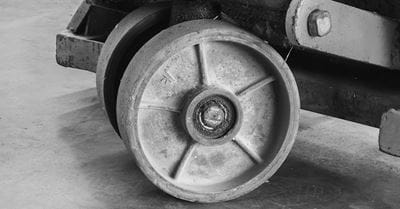Everything You Ever Wanted To Know About Pallet Jack Wheels

What do you need to consider when replacing the wheels on your pallet jack?
Depending on the amount of use your pallet jack gets, and the surfaces you use it on, you will need to replace the wheels from time to time. There are many options when it comes to replacing your wheels, so what should you take into consideration when you are making your choice?
You will need to understand the types of wheels on your pallet truck, the different materials available for replacing them, and how to know when they need replacement.
Pallet Jack Wheel Configuration
Most pallet jacks have four wheels, although you may find some that have six. In general, they have two steer wheels in the front and two load wheels in the rear.
Steer Wheels: Located in the front, these wheels are typically 7-8” in diameter, and are mounted on a swiveling base which is actuated by the control handle of the pallet jack. The swiveling action allows the operator to control the direction of the pallet jack.
Load Wheels: These wheels are embedded in the pallet jack forks, and are usually quite small, in most cases 3 inches or less. They don’t swivel and are aligned with the direction of the forks.
For both types of wheels, there are three main components:
Hub: The center of the wheel that the axle fits through.
Bearings: Steel ball bearings surround the hub, reducing friction and enabling the wheel to spin freely.
Tread: This is the outside part of the wheel that makes contact with the ground. Typically made of nylon or polyurethane, this is the component that is most susceptible to wear.
Polyurethane vs Nylon
Almost all pallet jack wheels are made of polyurethane or nylon, and each material has its own advantages and disadvantages.
Polyurethane Advantages:
- Long Lasting: These wheels can be very durable when used exclusively on smooth surfaces.
- Quiet: Poly wheels make very little noise vs nylon. That’s why they’re commonly used in customer-facing areas where smooth and silent operation is favored, like retail
- Low Resistance: Slightly easier to pull vs nylon.
- Non-Marking: This material does not leave marks.
Polyurethane Disadvantages:
- Resilience: Polyurethane is not as tough as nylon, and wheels are easily damaged when they run over debris and small items.
- Not Corrosion Resistant: These types of wheels are not suitable for surfaces that may have moisture, oil, or chemicals, as the material easily degrades.
Nylon Advantages:
- Heavy Duty: Nylon wheels can support greater weight capacity than polyurethane.
- Durability: Nylon is tougher than polyurethane and works better for environments where operators may encounter debris on the floor.
- Corrosion Resistance: These wheels are tougher and do not degrade as easily in the presence of chemicals, oil or moisture.
Nylon Disadvantages:
- Noise: Nylon wheels create more resistance and therefore make more noise.
- Residue: Nylon wheels can leave marks.
- Higher Resistance: For manual pallet jacks, nylon is quite as easy to pull as polyurethane.
When Do Pallet Jack Wheels Need To Be Replaced?
It’s important to routinely inspect your pallet jack wheels for damage, deterioration and wear. Well maintained wheels offer less resistance and make it easier on your employees, and damaged wheels can present a safety hazard.
Both steer wheels and load wheels should be replaced whenever they wear down a quarter inch or more. Wheels can be easily measured using a digital caliper.
When inspecting a wheel for damage, note any cracks in the hub, chunks missing from the tread, debris embedded in the tread, or wheels that are stuck or don’t turn freely.
Wheels should always be replaced in pairs, so if one steer wheel needs to be replaced, you will need to replace them both. Likewise with load wheels.
Prolonging The Useful Life Of Your Pallet Jack Wheels
- When treated properly, your pallet jack wheels can last quite a while. Here are some tips for making them last even longer:
- Never run your pallet jack over large cracks in concrete, significant drops, gaps or even larger obstacles like curbs or stairs. This can easily crack your wheels.
- Keep your floor free of debris. Running over nails, screws, shards of glass, wood chips or other small items can cause your wheels to chunk. If you do run over any debris, make sure to remove any that gets embedded in the wheel.
- Don’t leave a pallet jack loaded for long periods of time. A stationary pallet jack under load can create flat spots on the wheels, which will make them harder to pull.
- Don’t load more than the maximum capacity rating for your pallet jack. Excess weight can damage your wheels.
- Keep the wheels, bearing and axles of your pallet jack well lubricated.
Pallet Jack Wheels Near Me
If you need replacement wheels for your pallet jack, or you would like somebody to replace them for you, contact a material handling specialist at Raymond West today!

